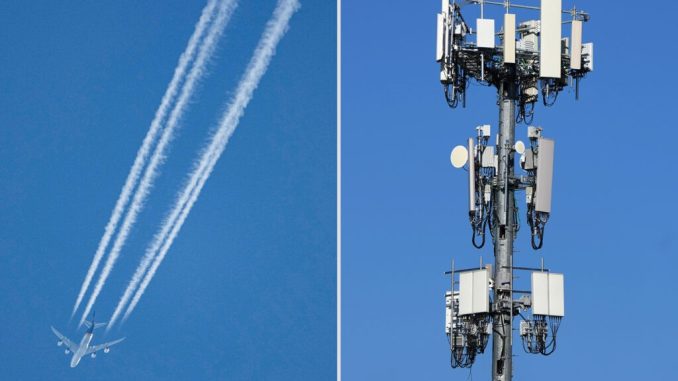
Original Article By JD Heyes
Verizon, AT&T set to activate thousands of new 5G towers, creating health and aviation concerns…
Though Americans have been registering their opposition to the expansion of 5G technology for years now, its roll-out has continued virtually unabated (in part, thanks to the pandemic), despite a host of legitimate concerns.
Significant risks include aviation safety, cyber security, environmental health, human health, weather forecasting and utility infrastructure, but again, none of those concerns have mattered either to the big telecoms or to a federal government that is supposed to protect the public and mitigate such dangers.
Meanwhile, previous studies have shown that 4G technology is still better, more reliable and safer than 5G, though last month, AT&T along with Verizon both announced they had activated a huge amount of additional 5G technology in the U.S., with plans to continue adding more throughout the year.
Verizon Communications Inc … plans to turn on around 2,000 additional towers in February in the next phase of its C-Band 5G deployment after talks with U.S. regulators, sources said.
The new phase comes after the U.S. Federal Aviation Administration (FAA) said on Friday it had agreed that Verizon and AT&T could safely turn on more 5G towers in a deployment that has been disrupted by aircraft safety concerns.
The newswire noted that in January, Verizon turned on roughly 5,100 towers and will be able to turn on an additional 2,000 this month, according to sources who also said that the total number could go up as aviation buffer zones are further defined.
There are ongoing concerns, however, that the new tech could interfere with highly sensitive commercial airline electronics, which delayed the C-Band 5G deployment, which was first planned for early December. In January, Verizon said it would not deploy some 500 towers near airports.
Airline industry executives blasted the government and the industry for not identifying the problems and going ahead with deployments despite the risks.
In mid-January, Emirates Airlines CEO Tim Clark blasted the 5G rollout as one of the biggest “screwups” in his many decades in the aviation travel industry in an interview with CNN.
He told the network that his airline was not aware of potential issues with Boeing 777 aircraft “to the extent that it was going to compromise the safety of operation of our aircraft and just about every other 777 operator to and from the United States and within the United States” until the day before a planned roll-out.

The network reported:
Specifically, the Federal Aviation Administration has been worried that 5G cellular antennas near some airports — not air travelers’ mobile devices — could throw off readings from some aircraft equipment designed to tell pilots how far they are from the ground. Those systems, known as radar altimeters, are used throughout a flight and are considered critical equipment. (Radar altimeters differ from standard altimeters, which rely on air pressure readings and do not use radio signals to gauge altitude.)
In December, the FAA issued an urgent order forbidding pilots from using the potentially affected altimeters around airports where low-visibility conditions would otherwise require them. That new rule could keep planes from getting to some airports in certain circumstances, because pilots would be unable to land using instruments alone.
“We were aware of a 5G issue. Okay. We are aware that everybody is trying to get 5G rolled out after all it’s the super-cool future of whatever it may be communication and information flow. We were not aware that the power of the antennas in the United States have been doubled compared to what’s going on elsewhere,” Clark told CNN.
“I need to be as candid as I normally am, and say this is one of the most delinquent, utterly irresponsible issue subjects, call it what you like, I’ve seen in my aviation career because it involves organs of government, manufacturers, science, etc. And you know, the notion that, for instance, the United States government should sell its franchise for all the frequencies for a large amount of money,” Clark continued.
“Somebody should have told them at the time – that the risks and the dangers they placed in certain frequency uses around field, airfields, metropolitan fields that should have been done at the time,” he added.
But by all means, let’s continue to allow 5G to be rolled out, regardless of the health and aviation safety risks. Money is always the driving factor for those individuals who love money more than people.





Be the first to comment